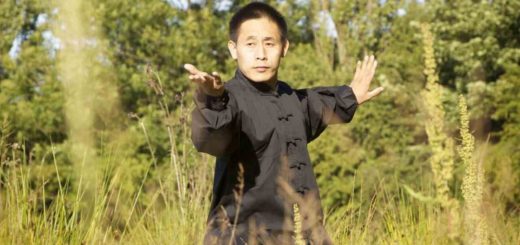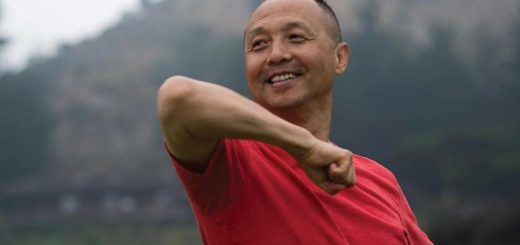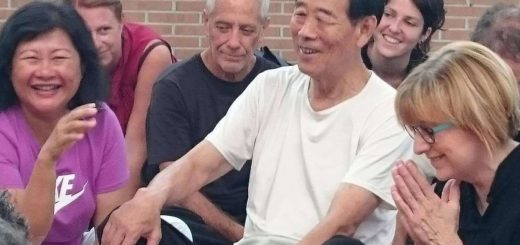Čchi-kung a wu-wej
For the English version of the article called „Qigong and wuwei“ see below.
P rincip wu-wej (wuwei) je jedním z geniálních filozofických vhledů, které přinesla starověká Čína a který je obtížně pochopitelný pro nás – lidi ze západu, jimž říkali, že „se musí usilovně snažit“.
Wu-wej
 Wu-wej doslova znamená „bez konání, zapřičinění nebo dělání“, ale prakticky to znamená, že se nevměšujeme, netlačíme a neprosazujeme své – nejdeme proti povaze věcí.
Wu-wej doslova znamená „bez konání, zapřičinění nebo dělání“, ale prakticky to znamená, že se nevměšujeme, netlačíme a neprosazujeme své – nejdeme proti povaze věcí.
Čínský znak pro wej se vyvinul ze symbolů označujících ruku jako pařát a opici – tj. wu-wej znamená nevrtat se v něčem/nepohrávat si s čím/neztrácet čas (pozn.: z anglického „monkey around“).
Přirozený chod věcí
Naznačuje vnitřní citlivost pro přirozenou formu, místo a rytmus věcí, např. jak teče voda a jak se zkušený plavec pohybuje vodou, nebo jak student čchi-kungu nebo tchaj-ťi „plave“ vzduchem.
Sladění se s wu-wej
V harmonii s wu-wej se nacházíme, pokud fungujeme v souladu s naší vnitřní podstatou (myslí, dechem a energií) a s podstatou světa kolem nás (např. s přitažlivostí, teplotou, zemí, která nás podepírá). Chyby, nepohodlí, obtíže a občas i zranění se v naší praxi objevují, buď pokud nebereme v úvahu vnitřní a vnější povahu věcí či se od ní odchylujeme.
Závěr citátu zní: „… Wu-wej se nesnaží. Nepřemýšlí o konání. Prostě činí. A když činí, vypadá to, že nijak příliš neusiluje. Ale přesto se věci dějí/stanou.“
Pokud se snažíte příliš, nebude váš čchi-kung ani tchaj-ťi fungovat tak dobře. Pokud budete usilovat nadmíru, začnete být strnulí, neohrabaní, zmatení.
Uvolněte se
Jedním z tajemství rodiny Jang (Yang), které převzal profesor Čeng Man-čching (Cheng Manching)*, bylo následující: „Uvolněte se, uvolněte se, uvolněte se!“
* Čeng Man-čching, jeden z největších mistrů tchaj-ťi čchüan 20. století, který působil v New Yorku, byl velice všestrannou osobností − zároveň byl významným lékařem, malířem, kaligrafem a básníkem.
Zdroj: Qigong and wu wei (Qigong is a way of being) – Rex Boaden
Qigong and wu wei
Wu wei is one of those brilliant philosophical insights that came out of ancient China, and which is at first difficult to understand for us in the west who were told „you must work hard“.
 Wu wei
Wu wei
Wu wei literally means „without doing, causing or making“ but practically it means without being meddlesome, forceful or assertive – not going against the nature of things.
The Chinese character for WEI developed from symbols for a clawing hand and a monkey – i. e. wu wei means no „monkeying around“.
The natural way of things
It suggests an inner sensitivity to the natural form, place and rhythm of things, like how water flows, or how a skilled swimmer moves through water, or how a qigong or tai chi practitioner „swims“ through the air.
Harmonising with wu wei
We harmonise with wu wei when we work, both with our inner nature (mind, breath and energy) and with the nature of the world around us (e.g. gravity, temperature, the ground that supports us). Mistakes, discomfort, difficulty, and sometimes injury occur in our practice when we either ignore or separate from the inner and outer nature of things.
The rest of the quote goes: “ …Wu wei doesn’t try. It doesn’t think about it. It just does it. And when it does, it doesn’t appear to do much of anything. But gets things done.“
Trying too hard, your qigong or tai chi doesn’t work so well. Trying too hard you become tense, awkward, befuddled.
Relax!
One of the Yang family secrets passed on to Professor Cheng Man-ch’ing was this: „Relax, relax, relax!“
Zdroj: Qigong and wu wei (Qigong is a way of being) – Rex Boaden



